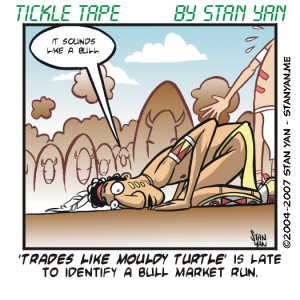Seasoned traders aren’t afraid to go with their gut instinct. After years of experience, an astute trader’s gut is the unconscious integration of all essential market information, the minimum amount of information required to make a sound action plan. All inputs are filtered through the seasoned trader’s mental working models, analyzed, and reflected as a hunch, a feeling nonetheless, but a valid, comprehensive feeling. Top-notch traders learn how to develop gut instincts and use them properly. But before a novice trader tries to use gut instinct, it is necessary to learn just what a gut instinct is and how it should be developed.
At first glance, going with a gut instinct while trading seems counterintuitive. A popular conception of trading is that market information is painstakingly analyzed and a logical conclusion is drawn. When one first starts out trading, it is essential to carefully understand the processes of how a decision is made. One should clearly specify the indicators, market conditions, and assumptions that are used to arrive at a decision. A novice trader is bound to make bad decisions at first. He or she is unaware of the various market conditions that may exist, or how to use market indicators efficiently and realistically. After years of experience, though, what was once deliberate and conscious becomes automatic and unconscious.
Similar to learning any skill, trading requires that one behave deliberately and carefully at first, but over time and after various experiences, one can act more naturally. It’s similar to how you learned how to drive a car or play a sport. Initially, you purposefully thought about each step and made sure you didn’t miss an important step, but now, you can act flawlessly and with little mental effort. It is the same for trading. Initially, you have to look at a variety of indicators carefully and think about the usefulness and meaning of each one, but over time and with practice, you can act decisively. That said, it is vital to realize that it is only after years of experience that a trader can make accurate, intuitive judgments. Just as you wouldn’t want to make misinformed, impulsive judgments, you don’t want to assume that you can make experienced decisions without actually having enough experience to rely on.
It is useful to practice making intuitive decisions. Early decisions may be inaccurate, but by gaining as much experience with the markets as possible and making as many trades as possible, the novice can build up an expert level of trading knowledge and trading perceptions that can be used later to make quick and accurate decisions. And after you develop the ability to make intuitive decisions, you can more easily go with the flow and trade in the zone. You can react quickly to ever-changing market conditions and capitalize on rare market moves. You’ll trade more efficiently, and the more efficiently you can trade, the more profits you’ll realize.


